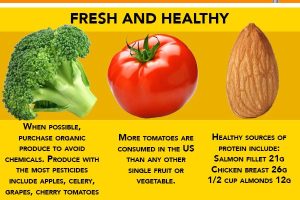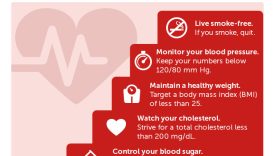Fuel Your Body Right: Nutrition Tips for Healthy Living

Importance of Nutrition
Nutrition plays a pivotal role in our overall health and well-being. It serves as the foundation upon which our bodies function, influencing everything from our energy levels to our immune system’s efficiency. Good nutrition equips us with the essential nutrients needed to grow, repair, and maintain our bodily systems. For instance, when a person consumes a balanced diet rich in fruits, vegetables, and whole grains, they’re not just preventing chronic diseases but also fostering a sense of vitality. Remember the last time you felt energized after a wholesome meal? That’s nutrition working its magic!
- Fuel Your Body Right: Nutrition Tips for Healthy Living
- Importance of Nutrition
- Benefits of Healthy Eating
- The Basics of Nutrition
- Macronutrients
- Micronutrients
- Building a Balanced Plate
- Portion Control
- Food Groups to Include
- Nutrient-Rich Foods to Include
- Fruits and Vegetables
- Whole Grains
- Hydration and Its Impact on Health
- Importance of Water
- Beverages to Limit
- Meal Planning and Preparation Tips
- Batch Cooking
- Healthy Snack Ideas
- Eating Out Healthily
- Making Smart Choices at Restaurants
- Tips for Navigating Buffets
- Supplementation and Its Role in Nutrition
- Common Supplements
- Consulting with a Healthcare Professional
- Special Considerations for Different Lifestyles
- Athletes and Active Individuals
- Vegetarians and Vegans
- Mindful Eating and Its Benefits
- Practicing Mindful Eating
- Mindful Eating Tips for Everyday Life
Benefits of Healthy Eating
Healthy eating goes beyond just managing weight; it offers a myriad of benefits, including:
- Improved Mood and Mental Health: Certain foods can enhance brain function and mood stability.
- Enhanced Energy Levels: Proper nutrition fuels the body, allowing for increased stamina throughout the day.
- Intervention Against Chronic Diseases: A diet rich in antioxidants, fibers, and healthy fats can reduce the risk of heart disease, diabetes, and obesity.
In essence, prioritizing nutrition can lead to a longer, more fulfilling life. Making informed choices today can pave the way for a healthier tomorrow!
The Basics of Nutrition
Macronutrients
Understanding the basics of nutrition is essential for making educated food choices. One key element is macronutrients, which are the nutrients our bodies need in large amounts to function effectively. They include:
- Carbohydrates: These are the body’s primary energy source. Think of whole grains, fruits, and vegetables as your go-to options.
- Proteins: Essential for building and repairing tissues, proteins can be found in sources like lean meats, beans, and dairy.
- Fats: While often misunderstood, healthy fats, such as those found in avocados and nuts, are crucial for brain health and hormone production.
Reflecting on personal experiences, many might recall times when a carbohydrate-rich meal provided a quick energy boost for an afternoon activity.
Micronutrients
On the flip side, we have micronutrients—vitamins and minerals that our bodies require in smaller amounts but are equally vital. These nutrients play roles in various bodily functions, such as:
- Vitamins (like Vitamin C and Vitamin D): Important for immune function and bone health.
- Minerals (like iron and calcium): Essential for oxygen transport and the development of strong bones.
Incorporating a variety of colorful fruits and vegetables in your meals can help ensure you’re getting a good mix of both macronutrients and micronutrients. Balance is key to thriving!
Building a Balanced Plate
Portion Control
Once the fundamentals of nutrition are understood, the next crucial step is building a balanced plate. A significant aspect of this is portion control. It’s easy to overlook how much food we’re putting on our plates, but managing portion sizes can help prevent overeating. A practical method many find helpful is the “plate method.” Imagine dividing your plate into sections, such as:
- 50% for vegetables and fruits: Think vibrant, nutrient-dense options.
- 25% for proteins: Choose lean meats or plant-based proteins.
- 25% for whole grains: Opt for quinoa, brown rice, or whole-grain bread.
Food Groups to Include
Incorporating a variety of food groups is essential for a well-rounded diet. Ideally, a balanced plate includes:
- Fruits and Vegetables: Aim for a rainbow of colors; the more variety, the more nutrients!
- Whole Grains: They provide sustained energy and fiber.
- Lean Proteins: These aid in muscle repair and growth.
When planning meals, consider how different food groups complement one another. Not only does this approach support health, but it can also make meals more enjoyable and satisfying—just like those family dinners where everyone contributes their favorite healthy dish!
Nutrient-Rich Foods to Include
Fruits and Vegetables
Continuing from our discussion on building a balanced plate, let’s dive into some nutrient-rich foods that should become staples in your diet—starting with fruits and vegetables. These powerhouses of nutrition are packed with vitamins, minerals, and antioxidants, making them essential for maintaining optimal health. Consider incorporating a variety of options, such as:
- Berries: High in antioxidants and fiber, perfect for snacking or adding to smoothies.
- Leafy Greens: Spinach and kale are great bases for salads or can be blended into smoothies without a strong taste.
- Colorful Bell Peppers: Rich in Vitamin C, ideal for salads or stir-fries.
Not only do these foods nourish our bodies, but they also add vibrant colors and textures to our meals.
Whole Grains
Next on the list are whole grains. These foods are vital sources of energy and can help keep you feeling full longer. By opting for whole grains over refined grains, you increase your intake of fiber, which supports digestive health. Some great examples include:
- Quinoa: A complete protein that’s gluten-free and can be used in various dishes.
- Brown Rice: A comforting staple that pairs well with almost anything.
- Oats: Perfect for breakfast to kickstart your day with sustained energy.
By incorporating these nutrient-rich foods into your diet, you’ll not only bolster your health but also enjoy the delicious variety they offer!
Hydration and Its Impact on Health
Importance of Water
As we explore further into nutritious habits, we cannot overlook the role of hydration—especially the importance of water. Water is essential for nearly every function in our body, from regulating body temperature to aiding digestion. Many people are surprised to learn that even a slight dehydration can lead to fatigue and decreased concentration. A helpful tip is to keep a water bottle handy; it serves as a visual reminder to sip throughout the day. For instance, when I started tracking my water intake, I felt more energized and focused—an immediate benefit I didn’t expect!
Beverages to Limit
While hydration is vital, not all beverages contribute positively. It’s wise to limit certain drinks that can hinder health goals. Consider cutting back on:
- Sugary Drinks: Sodas and sweetened beverages can lead to weight gain and tooth decay.
- Alcohol: Excessive consumption can dehydrate the body and affect overall health.
By focusing on water and nutrient-dense beverages, such as herbal teas, you pave the way to a healthier lifestyle. Remember, choosing the right drinks is just as critical as what’s on your plate!
Meal Planning and Preparation Tips
Batch Cooking
Now that hydration is sorted, let’s talk about practical strategies for maintaining a balanced diet: meal planning and preparation. One of the most effective methods is batch cooking. This technique involves preparing large quantities of meals in advance so that you always have healthy options on hand. For example, on a Sunday, I typically cook a big pot of quinoa, roast a tray of mixed vegetables, and grill chicken. These can easily be portioned out for quick lunches or dinners during the week. It saves time, reduces stress, and you’re less likely to turn to less nutritious options on busy nights.
Healthy Snack Ideas
In addition to meals, having healthy snacks ready can help maintain energy levels and curb cravings. Some go-to ideas include:
- Greek yogurt with honey and berries: Packed with protein and satisfying sweetness.
- Veggie sticks with hummus: A crunchy and filling option.
- Nuts and dried fruit: Perfect for a quick, on-the-go energy boost.
By planning and preparing meals and snacks, you build a foundation for healthier eating habits without feeling overwhelmed or deprived. It’s all about making nutritious choices easier!
Eating Out Healthily
Making Smart Choices at Restaurants
Transitioning from meal prep at home to eating out can be a bit tricky, but with the right mindset, you can make smart choices at restaurants without compromising enjoyment. Firstly, look for menus that highlight fresh ingredients or seasonal dishes, as these options are often healthier.
- Ask for dressings and sauces on the side: This way, you control the amount you consume.
- Choose grilled, baked, or steamed options over fried items, which are typically higher in calories and unhealthy fats.
When dining out, I often remind myself to enjoy the meal but also prioritize my health—it’s all about balance!
Tips for Navigating Buffets
Buffets can be a haven for healthy eating if approached strategically. Here are some tips for navigating buffets effectively:
- Start with a salad: It helps fill you up with low-calorie foods.
- Use a smaller plate: This can help control portion sizes.
- Prioritize proteins and veggies: Fill half your plate with vegetables and the other half with lean proteins like chicken or fish.
By maintaining a mindful approach while dining out, you can relish the experience without derailing your healthy eating journey!
Supplementation and Its Role in Nutrition
Common Supplements
As we continue to explore nutrition, it’s vital to address supplementation and its role. While a balanced diet should provide most nutrients, sometimes supplements can help fill in the gaps. Common dietary supplements include:
- Multivitamins: A convenient way to cover multiple nutrient bases.
- Vitamin D: Particularly essential in colder months when sunlight exposure is limited.
- Omega-3 Fatty Acids: Great for heart health, found in fish oil supplements.
I often take a multivitamin to ensure I’m hitting my daily nutrient goals, especially on busy days when my meals might be less varied.
Consulting with a Healthcare Professional
Before jumping into any supplement regimen, it’s crucial to consult with a healthcare professional. They can help determine your individual needs based on factors such as age, diet, and lifestyle. Consider asking questions like:
- Do I really need supplements?
- What dosages are appropriate for my needs?
Taking this step ensures you’re making informed decisions tailored to your health, avoiding unnecessary expenses or potential interactions with medications. Together, a balanced diet and the right supplements can lead to optimal health!
Special Considerations for Different Lifestyles
Athletes and Active Individuals
Transitioning from supplementation, it’s essential to consider special dietary needs based on lifestyle. For athletes and active individuals, nutrition is critical for performance and recovery. They require higher caloric intake and specific nutrients to sustain energy and enhance recovery. Key areas to focus on include:
- Proteins: Essential for muscle repair. Lean meats, legumes, and dairy are great sources.
- Carbohydrates: Vital for fueling workouts. Whole grains and fruits should be a staple.
- Hydration: Maintaining fluid balance is crucial, especially during intense training.
I remember a time when I didn’t prioritize carbs before a big run. The lack of energy was noticeable, and I learned the hard way how critical nutrition is for performance!
Vegetarians and Vegans
For those following vegetarian or vegan diets, ensuring adequate nutrient intake is equally important. Special attention should be paid to:
- Protein sources: Incorporate beans, lentils, tofu, and quinoa to meet protein needs.
- Vitamin B12: Often lacking in plant-based diets, so consider fortified foods or supplements.
- Iron: Plant-based sources like spinach and lentils can help, but pairing them with Vitamin C-rich foods enhances absorption.
Personalizing nutrition based on lifestyle choices ensures that everyone can thrive, regardless of dietary preferences!
Mindful Eating and Its Benefits
Practicing Mindful Eating
Moving from special dietary considerations, let’s delve into the concept of mindful eating. This practice encourages awareness of our food choices and the eating experience itself. By slowing down and being present during meals, we can cultivate a healthier relationship with food. To practice mindful eating, start by:
- Eliminating distractions: Put away phones and turn off the TV to focus solely on your meal.
- Savoring each bite: Take time to enjoy flavors and textures; it helps enhance satisfaction.
- Listening to your hunger cues: Eat when you’re hungry and stop when you’re full, which can prevent overeating.
I’ve found that when I take time to focus on my meal, I appreciate it more and tend to eat less.
Mindful Eating Tips for Everyday Life
Incorporating mindful eating into daily routines can be straightforward. Here are a few practical tips:
- Eat slowly: Chew thoroughly and relish your food, making meals last longer.
- Serve smaller portions: Start with less on your plate; you can always get more if needed.
- Reflect after meals: Consider how the food made you feel both physically and emotionally.
These tips create more profound connections with our meals and promote better eating habits, ultimately fostering a healthier lifestyle!





